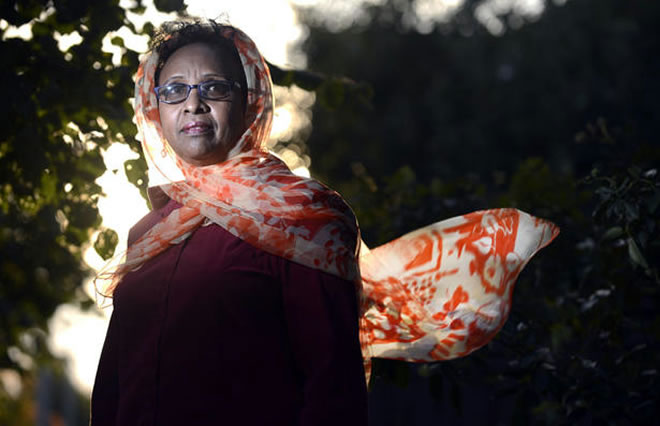
Friday, November 23, 2012
Jayme Poisson

Habiba Adan, with a force of conviction wrought by grief over her son's violent death, was instrumental in bringing together members of the struggling Somali community with provincial and city leaders to see what can be done about violence, unemployment and other major issues facing youth.
“Today is just the beginning.”
The remarks came at the closing of a conference held to discuss issues affecting Somali-Canadians, particularly young men, six of whom have been shot dead in Toronto since June.
“We need to continue to have conversations; we need to look at working in partnership with our police, with our schools, with our community agencies, to respond to some of the issues that are specific to the community and tackle broader issues that have an impact on the Somali community, but there’s no doubt, have an impact on many communities,” Broten said in an interview with the Star.
About 200 people packed into a conference centre on Dixon Rd. on Thursday — a large contingent from the Somali community, as well as representatives from the Toronto District School Board, Toronto Police Chief Bill Blair and MPPs. City staff were also on hand.
Canadian-Somali hip hop artist K’Naan flew in, making a rallying call for action.
The conference, as the government labeled it, (though many in the community that asked for it called it a summit), was closed to media.
But attendees said Blair encouraged Somali youth to apply to be police officers, addressing concerns that there is only one Somali cop in the city. There were discussions on how the criminal justice system interacts with Somali youth, as well as the lack of employment opportunities. Currently, the unemployment rate for Somali-Canadians is above 20 per cent, the highest of any ethnic group.
“I’m really hopeful something will come,” said Habiba Adan, whose 26-year-old son, Warsame Ali, was shot to death in Jamestown in September. In the months before her son’s death, Adan had joined a group of women working to lobby politicians and decision-makers for systemic change in the midst of a mounting crisis.
After her son’s death, her resolve took on the force of the bullet that killed him.
She convinced then-youth minister Eric Hoskins, also on hand Wednesday, to call the meeting. She and the women of her group, Positive Change, have been showing up at politicians’ offices armed with whistles.
“We will blow the whistles until something has changed,” she said Wednesday.
“Everyone has a role to play in this. Every level of government. Every generation in the community and the broader community and all of our community partners have a role to play so young Somali-Canadians have every opportunity ahead of them that we aspire for,” said Broten, adding that she plans to take away and analyze what was said Wednesday, then continue working with the community.
In the wake of this summer’s Danzig St. shootings, the province launched a $20 million Youth Action Plan aimed at addressing some of the root causes of youth violence. Highlighting some of its components, Broten noted the government’s commitment to family literacy centres and Tuesday’s announcement of dozens of new after-school programs. On Wednesday she was interested in discussing various ways in which the plan could be part of the solution for Somali youth, and youth across the city.
One issue unique to Toronto’s Somali community is education. Somali-Canadian kids — boys, in particular — are dropping out of high school at double the average rate.
On Tuesday, trustees with the Toronto District School Board voted to establish a task force aimed at addressing the issues faced by Somali students. Portuguese students, who also have high dropout rates, got a similar task force last year.
“We know that a number of Somali students are struggling to reach their full potential. Together with the community, we hope to engage our Somali students and work toward closing the achievement gap,” TDSB chair Chris Bolton said in a statement.
Positive Change member Faduma Mohamed, a passionate, no-nonsense woman, was buoyed by the atmosphere Wednesday, but added it was “a lot of talk of the same issues.
“We will see ... if the government now will take the recommendation of some of the people.”